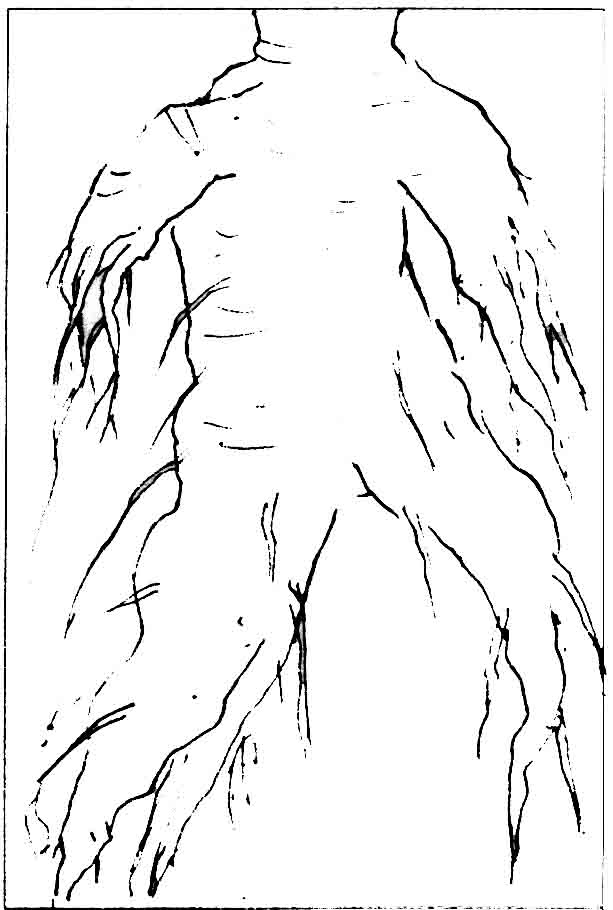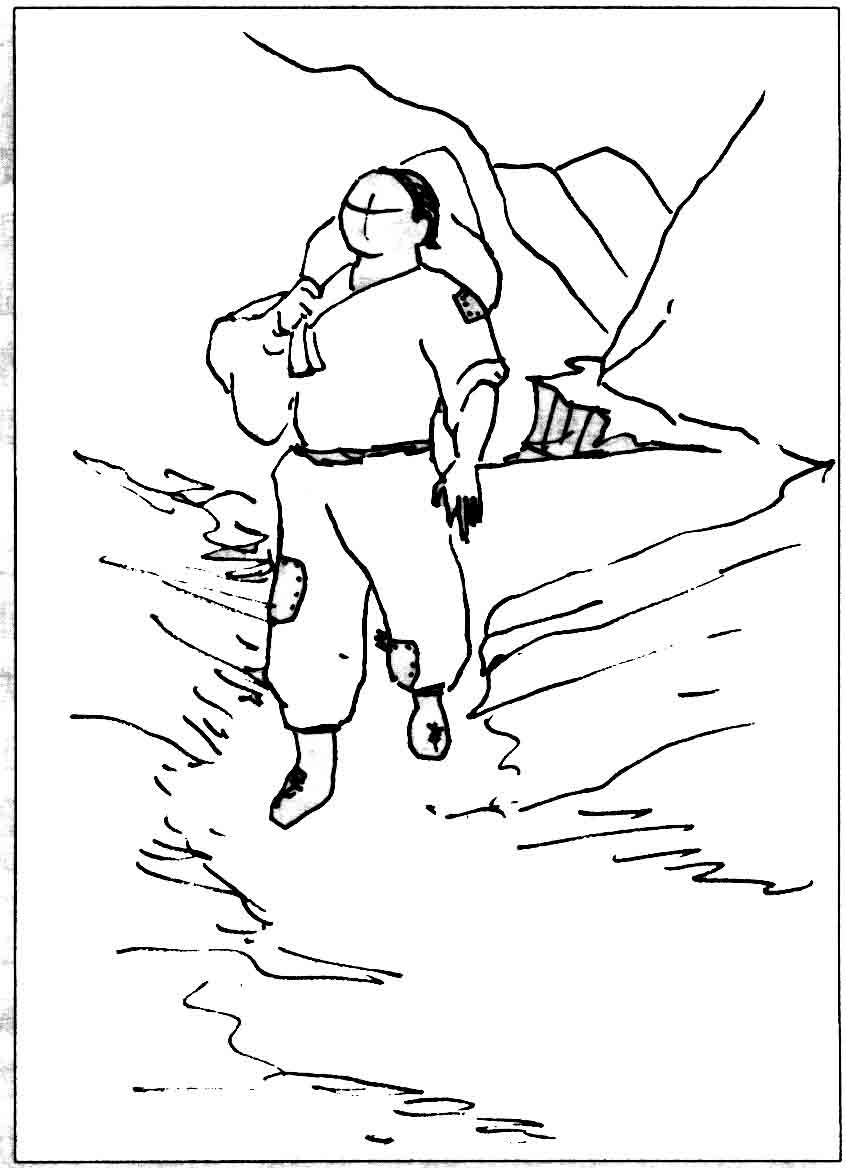這個世界上,「窮在街前無人問,富在深山有遠親。」又有幾句話說的「白馬紅鷹財色親,不是親者搶來親。」白馬紅鷹財色親,這是形容這個人有錢;不是親者搶來親嘛,就是沒有親戚也說有親戚了。這世界的人心是這樣的,可是就是在這樣的時候,看你立得住、立不住。你若隨流俗所轉,儘錦上添花,不能雪中送炭,這就是同乎流俗,合乎污世。你在這個倫常乖舛、斯文掃地、人心不古、道德淪亡的時候,你要再能做疾風中的勁燭,烈火內的精金。在東北有一句話,說「凍死迎風站,餓死挺肚行」,這是一種凜然不可侵犯的氣節。在這個濁世之中,若還不同乎流俗,合乎污世,這就是天地的正氣所鍾,不為這財色名食睡所轉變。
現在講到這個吉林省,那時候是雙城縣多歡站的一個明老五。這個多歡站的地方,離我拉林鎮十八里路;在我那個西黃旗的西南邊,有一個鄉村叫多歡站。多歡站——由這個名字就知道這個地方是不守規矩的人多,遊手好閒的人多,也是紈骻子弟人多。那個地方大約就因為這明老五,他是一個暴發戶,以後又表示他這個豪華奢侈,所以那個地方是很歡樂的。很歡樂的地方,人就都是不守規矩的,所以這個多歡站,若到那個地方一站,大約就都有多少流連忘返的意義存在。
這個明老五,他是清朝時候的人,也是近代的人,是個投機份子。怎麼知道他是投機份子呢?第一,他想要空手取寶,做不用大本錢的大生意。做大生意要大本錢,那麼他做一個小本的大生意,是什麼呢?就是去到山裡頭找寶貝。到山裡找寶貝,一個人去是很危險,因為山裡頭有很多的狼熊虎豹,毒蛇猛獸,必須要有一個同伴。於是乎,他就找了一個結拜的兄弟,兩個人一起到山上去挖人蔘。可是這個人蔘自己也有一種靈性,它所長的地方,都在懸巖絕壁––人到不了的地方,獸上不去的地方,小鳥也無處棲身的地方,因為沒有那麼多樹木。在這個人跡罕到、獸不能行的地方,它生出來,這也就是它自己有這種靈性要保護自己,所以生在這種危險的地方。
 |
◆人篸Ginseng |
那麼和他這個朋友兩個人到山裡頭去找寶貝,大約也是他們兩個人的命運,應該得到這個寶貝,所以就得到了。沒得寶貝的時候,兩個人是結義兄弟,互相幫助;得到寶貝了,他就生出一種爭心、貪心。在山上這種人蔘,這種寶貝據說七兩就叫人蔘,八兩就叫人寶了。怎麼叫人寶了呢?人吃了這種的人蔘,就可以長生不老、益壽延年。因為人都應該死,可是都不願意死、都怕死,若能有方法令他這個壽命延長了,他就求生欲都生出來了。所謂「好死不如癩活著」,都有這一種執著的見解在自己的八識田裡頭。因為這個,所以就拿這個八兩的人蔘當寶貝。那麼他得到這個人蔘呢,大約不只七兩、八兩,恐怕有十六兩都不止,所以就變成一個奇寶,也是一個奇貨,所謂奇貨可居。
在當時他就想:「欸!這個寶貝值的錢一定不少,可是如果兩個人分,這個錢就少了;若一個人獨占呢,這個錢都用不完了。」因為這樣子,於是乎他就想把這結義的兄弟殺了。怎麼樣殺呢?很簡單,這個山路都非常難走的,這崎嶇路,劍樹纏叢路,崎嶇不易行;這一種彎彎曲曲的路,還有懸巖、峭壁,於是乎他就想:「啊!這個義兄弟呀,你在前面走,我到這個危險的地方,一下子就把你推下,摔死你,摔得你粉身碎骨!那麼這個寶貝是我拿著呢,我就得到了。」這麼樣子,於是乎他就把這個結拜的兄弟,推到山澗裡頭去了。
這個財富都自己得到了,於是乎就自己進京去獻寶。當時滿洲里東三省那個地方的關內,也設一種關卡,關外的寶貴東西不能往關內運,關內的寶貴東西也不能往關外運,所以就好像現在這個海關一樣。那麼他到這海關上,他想這麼值錢的東西,這個寶貝如果被海關給查出來,給沒收了,他也沒有辦法。於是乎嘛,他就買了一個棺材,把這個人蔘放到棺材裡,往關內運,這個守關的一問他:「你這裡邊是什麼人死的啊?」他說是他爸爸。說:「我們要打開看一看。」這一要打開看,可就把他嚇出一身汗了。嚇出一身汗,也還是說是他爸爸。那麼打開一看,果然這個人蔘居然就變成一個白頭髮、白鬍子的老頭子屍首。那麼守關的沒驗出來,他就過去了。過去,就拿到了關內,把這個人蔘取出來了,棺材也送給人了。
那麼這樣子,就到皇帝那兒去進供,皇帝從來也沒有遇著這樣的靈丹妙藥、這個奇寶。於是乎嘛,也不知道價錢,就給他很多金子銀子。賞了很多金子銀子之後,他就帶這個金子回家。那時候交通都不便,最有錢的人坐的,也就是馬車––坐小轎子車。那麼他叫了小轎子車,可是他不是給人坐,他把這個金子都放到車上拉著。大約叫了幾個車,那麼他走累了,就到車上坐坐,不走累的時候就跟著這個車跑。這一路上,他因為金子太多了,也就買,買什麼呢?買地、買產業。他買產業不是像一般人那麼買,他是一條村一條村這麼買;你這一條村通通有多少地,有幾個井,你大家合計合計想要賣多少錢,那他就都包著買下了。
待續 |
|
In this world, "The poor live on the streets, but no one asks after them; the rich may live deep in the mountains, but they have relatives even from afar." There is another saying: "The white horse and the red eagle, wealth and fame evoke relatives; people who are not related seize the position of relatives." "The white horse and red eagle, wealth and fame evoke relatives" means that when someone is rich, "those who are not relatives will insist on being relatives," that is, even though they aren't related to you, they still claim to be your relatives. That's how the minds of worldly people are, but this situation is just a test to see whether or not you can stand firmly. If you follow the ways of the world, "adding flowers to brocade" (doing superfluous things) but not "sending charcoal during a snowfall" (helping those in need), then you are only flowing with the defiled current. During this time when human relationships are all messed up, intellectual culture trails in the dust, the minds of the people are not what they used to be, and morality is totally ruined, you should hold to your principles like a steady candle in the gale and like real gold which is not destroyed in a blazing fire. There is a saying in Manchuria: "Freezing to death, we stand firmly against the wind; / Starving to death, we walk steadily holding our bellies." This is an awe-inspiring righteousness which cannot be encroached upon. If one can live in this turbid world without wallowing in the mire and going along with the corrupted trends, then one is favored by the proper energy of heaven and earth and unmoved by wealth, sex, fame, food, and sleep.
In Jilin province (in Manchuria), there was a man named Ming Laowu who lived in Duohuanzhan (Station of Much Pleasure) in Shuang Cheng County. Duohuanzhan was a village to the southwest of Xihuangchi (West Yellow Flag) about eighteen li away from Lalin County where I lived. One can tell from the name of this village, "Station of Much Pleasure," that most of the people there did not like to follow the rules; there were many who loitered about in idleness and many young men from wealthy families who were good for nothing. It was probably also because of Ming Laowu, who had come into sudden wealth and later flaunted his luxurious lifestyle, that the place was so full of pleasure. If there is a lot of entertainment at a place, then the people there will tend not to follow the rules. Therefore, another meaning of Duohuanzhan (literally "much pleasure stand") is that if people just go there and stand for a while, they will probably forget to go home because of the enjoyable experience.
Ming Laowu lived during the Qing dynasty, so he was a person of the recent past. He was an opportunist. How do we know that he was an opportunist? First of all, he wanted to obtain treasures empty-handed, that is, to use only a small amount of capital to do big business. Big business usually requires a large amount of capital; what kind of big business did he do with small capital? He went into the mountains to hunt for treasures. It is dangerous to go treasure hunting alone in the mountains, for there are many wolves, bears, tigers, leopards, poisonous snakes, and other fierce animals; one must have a partner. So he found someone with whom he pledged an oath of brotherhood, and the two of them went into the mountains to dig for ginseng. Ginseng has its own kind of intelligence, and it usually grows on overhanging precipices and steep cliffs--places that people cannot reach, animals cannot climb to, and even birds cannot perch on because of the sparse trees. Ginseng grows in these places where people rarely go and animals don't travel because it has its own kind of efficacious nature and knows how to protect itself. That's why it grows in such dangerous places.
When Ming Laowu and his friend went looking for treasures in the mountains, probably they were fated to find a treasure, and so they finally obtained one. Before they found the treasure, they had been sworn brothers who helped each other out; but they came upon the treasure, Ming Laowu began having thoughts of contention and greed. It is said that if a piece of mountain-grown ginseng weighs seven ounces, it is called "ginseng" (ren seng); if it weighs eight ounces, it is called a "human treasure" (ren bao). Why is it called a "human treasure"? Because when people eat that kind of ginseng, it can prolong their life and make them immortal. Although everyone has to die, no one wants to. Everyone is afraid of death, and if there is some way to prolong our lives, we all have the desire to live. There is a saying: "To live in misery is better than to die in the best of conditions." We all have this kind of attached view in our eighth consciousness. Because of this, people regard eight ounces of ginseng as something precious. The ginseng that Ming Laowu found was probably not merely seven or eight ounces; it may have weighed more than sixteen ounces, so it really was a rare treasure and a precious commodity.
At the time, he thought: "Oh! This treasure must be worth a great deal of money, but if we have to divide it between the two of us, the money will be less; if one person takes the whole thing, the money it brings in will never run out." Therefore he schemed to murder his sworn brother. How did he do it? Very simple. The mountain paths were rugged and overgrown with bushes and trees as sharp as swords. They were really difficult to travel. Seeing the crooked paths, as well as the overhanging precipices and steep cliffs, he thought, "Ha! Okay, sworn brother, I'll let you walk in front of me, and when we reach a dangerous place, I'll just give you a push, and then you will fall to your death--all the bones in your body will be smashed! Then the treasure will be all mine!" Thinking in this way, he pushed his sworn brother into a mountain torrent.
Now that all the wealth was his, he went to the capital to present the treasure. At the time, inside the Manchu Li Pass there was a custom-house which prohibited valuable objects outside the Pass from being transported inside, and valuable objects inside the Pass from being transported outside. It was just like the maritime customs we have nowadays. Ming Laowu thought, "This treasure is so valuable. If the customs officials discover my treasure and confiscate it, I won't be able to do anything about it." So he bought a coffin and placed the ginseng in it, and then had it transported to the pass. The customs official asked him, "Who is the deceased person in the coffin?" He said it was his father. "We have to open it and take a look," the official said. Hearing that they wanted to open it, he broke out in a cold sweat, but still insisted that it was his father. When the coffin was opened, the ginseng had indeed turned into a corpse of an old man with gray hair and a gray beard. The officials didn't find out the truth, and so he made it through customs. After he had taken the coffin inside the pass, he took out the ginseng and gave the coffin away.

Then Ming Laowu went to present the offering to the Emperor. The Emperor had never seen such an efficacious medicine, such a rare treasure. Not knowing its actual value, the Emperor rewarded him with a great deal of gold and silver. Then Ming Laowu took all of the gold and silver and went home. Transportation in those days was not as convenient as it is now. Even the richest people could only take a horse carriage or ride in a sedan chair. Ming Laowu hired a few sedan chairs, not for people to ride in, but for carrying the gold. When he was tired out from walking, he would ride in a sedan chair. When he wasn't tired, he walked along beside the sedan chairs. On the way home, because he had too much gold, he started making purchases. What did he buy? Land. Property. He didn't buy property the way ordinary people did. He bought entire villages at a time. He would tell the people in each village to count up how much land and how many wells their village had and calculate the price, and then he would buy the whole village.
To be continued |